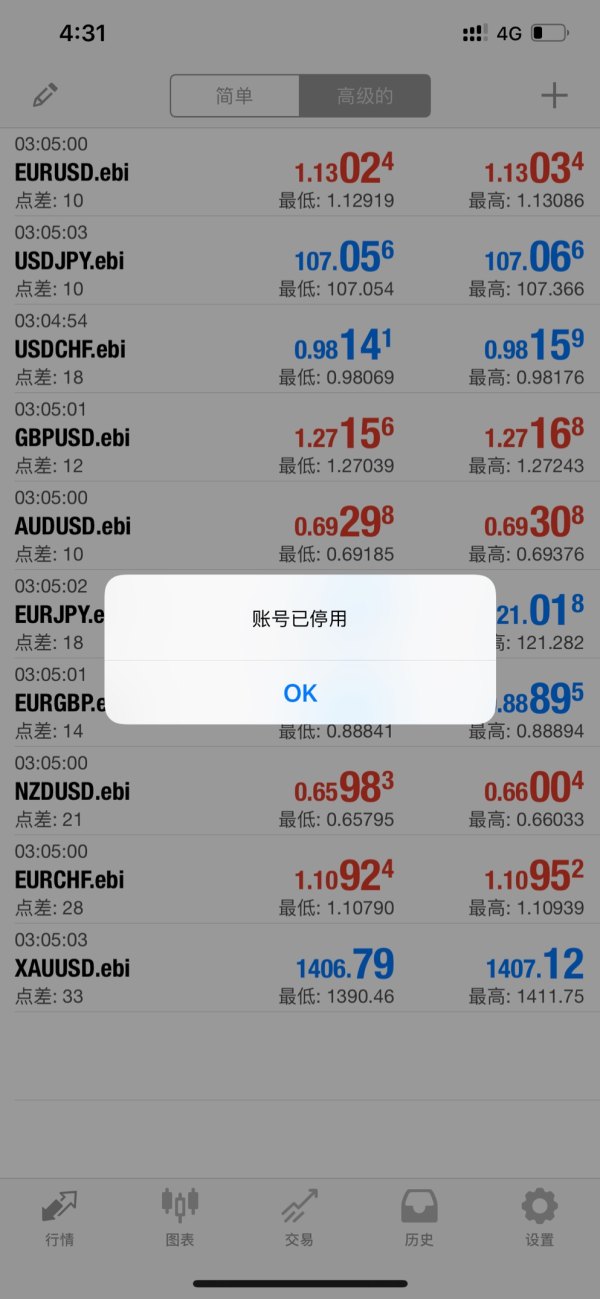EBI 2025 Review: Everything You Need to Know
Executive Summary
This comprehensive ebi review examines a broker entity that presents a complex picture in the financial services landscape. Based on available information from 2025, EBI appears to operate in multiple domains, including financial services and consulting, though detailed regulatory information remains limited in public sources. The company has established a presence in the European market. It focuses particularly on alternative lending and financial technology services.
EBI's operations span across different business verticals, including what appears to be brokerage services and specialized consulting in environmental and financial sectors. However, specific information regarding traditional forex brokerage operations, trading conditions, and regulatory oversight remains unclear from available public documentation. The company's positioning suggests a focus on institutional services rather than retail trading. This may explain the limited availability of typical broker-related information such as spreads, leverage ratios, and trading platforms.
The target audience for EBI services appears to be institutional clients and businesses seeking specialized financial consulting rather than individual retail traders. This positioning places EBI in a niche market segment that differs significantly from traditional retail forex brokers. It requires a different evaluation framework for potential users seeking conventional trading services.
Important Notice
This evaluation is based on publicly available information as of 2025. Readers should note that EBI's business model appears to differ from traditional retail forex brokers. The company's regulatory status and specific trading conditions are not clearly outlined in available documentation. This may indicate either a focus on non-regulated services or operations under different jurisdictional frameworks across various regions.
The assessment methodology employed in this review relies on available public information, industry reports, and documented business activities. Potential clients should conduct independent due diligence and verify current regulatory status and service offerings directly with the company. Information may vary by region and service type.
Rating Framework
Broker Overview
EBI operates as a multifaceted financial services entity with documented activities in alternative lending analysis and institutional financial consulting. The company has established a presence in European markets. It shows particular expertise in analyzing alternative investment funds and debt instruments. According to available documentation, EBI has been involved in comprehensive reviews of alternative lending markets. The company examines the growth patterns of non-traditional lenders and their systemic importance within the broader financial ecosystem.
The company's business model appears to focus on institutional services rather than retail trading operations. EBI's documented work includes analysis of Alternative Investment Funds and debt funds. This suggests a sophisticated understanding of complex financial instruments and market dynamics. This positioning indicates that EBI may serve institutional clients, fund managers, and corporate entities rather than individual retail traders seeking standard forex brokerage services.
EBI's operational framework encompasses research and analysis capabilities. This is evidenced by their monthly review publications covering alternative lending markets. The company demonstrates expertise in identifying market trends, analyzing risk channels, and assessing systemic importance of financial institutions. However, traditional broker services such as retail trading platforms, standard account types, and typical forex trading conditions are not prominently featured in available documentation. This suggests a different business focus than conventional retail brokers.
Regulatory Jurisdictions: Specific regulatory information for EBI's brokerage operations is not clearly documented in available sources. This may indicate operations under different regulatory frameworks or focus on non-regulated institutional services.
Deposit and Withdrawal Methods: Information regarding standard deposit and withdrawal methods typically associated with retail brokerage services is not detailed in available documentation.
Minimum Deposit Requirements: Specific minimum deposit requirements for trading accounts are not outlined in accessible public information.
Bonuses and Promotions: No information regarding promotional offers or bonus structures is available in current documentation.
Tradeable Assets: The range of tradeable instruments and asset classes is not specified in available materials. The company's focus on alternative investments suggests potential access to non-traditional financial instruments.
Cost Structure: Detailed information about spreads, commissions, and fee structures is not provided in available documentation. This makes cost comparison with traditional brokers challenging.
Leverage Ratios: Specific leverage offerings and margin requirements are not documented in accessible sources.
Platform Options: Information about trading platforms and technological infrastructure is not detailed in available materials.
Regional Restrictions: Specific geographic limitations or service availability by region is not clearly outlined in current documentation.
Customer Support Languages: Available languages for customer support services are not specified in accessible information.
This ebi review highlights the limited availability of traditional broker information. It suggests that potential clients seeking conventional forex trading services may need to contact EBI directly for specific trading conditions and service offerings.
Detailed Rating Analysis
Account Conditions Analysis
The evaluation of EBI's account conditions reveals significant gaps in publicly available information regarding traditional brokerage account structures. Unlike conventional forex brokers that typically offer multiple account tiers with varying features and minimum deposits, EBI's account offerings are not clearly documented in accessible sources. This absence of detailed account information suggests either a focus on customized institutional arrangements or a different service model than traditional retail brokerage.
The lack of transparent account condition information presents challenges for potential clients seeking to understand entry requirements, account features, and service levels. Traditional account elements such as minimum deposit amounts, account types, and specific account benefits are not outlined in available documentation. This opacity in account structure information may indicate that EBI operates on a consultation-based model where account conditions are determined through individual client discussions rather than standardized offerings.
For clients accustomed to traditional broker account structures with clear tiering and transparent conditions, EBI's approach may require direct engagement to understand available options. The absence of readily available account information in this ebi review reflects the limited public documentation of standard brokerage services. Potential clients should consider this when evaluating EBI for their trading needs.
EBI's tools and resources portfolio appears to focus on institutional-grade analysis and research capabilities rather than traditional retail trading tools. Based on available documentation, the company demonstrates expertise in producing comprehensive market analysis, particularly in alternative lending and investment fund sectors. Their monthly review publications suggest access to sophisticated analytical resources and market intelligence capabilities that may benefit institutional clients and professional investors.
The company's research output indicates access to comprehensive data sources and analytical frameworks for examining complex financial market dynamics. EBI's documented ability to analyze systemic risk channels and assess the importance of alternative lenders suggests robust analytical tools and methodologies. However, traditional retail trading tools such as technical analysis software, automated trading systems, and standard charting packages are not prominently featured in available information.
Educational resources and client training materials, typically offered by retail brokers, are not detailed in accessible documentation. The absence of information about trading calculators, economic calendars, and market news feeds suggests that EBI's resource allocation may prioritize institutional research over retail trader support tools. This positioning may appeal to sophisticated investors seeking advanced market analysis but may not meet the needs of traders requiring standard retail trading resources.
Customer Service and Support Analysis
Information regarding EBI's customer service structure and support capabilities is limited in available documentation. Traditional customer service metrics such as response times, available communication channels, and support hours are not detailed in accessible sources. This lack of transparent customer service information may indicate either a focus on relationship-based institutional service models or limited retail client support infrastructure.
The absence of detailed customer service information presents challenges for potential clients seeking to understand support availability and service quality. Conventional broker support features such as live chat, phone support, email assistance, and multilingual capabilities are not documented in available materials. This gap in service information suggests that potential clients may need to engage directly with EBI to understand available support options and service levels.
Professional service organizations often operate on relationship-based support models where client service is delivered through dedicated account management rather than standardized support channels. EBI's approach may reflect this institutional service model. However, specific details about client support structures are not available in current documentation for this review.
Trading Experience Analysis
The evaluation of EBI's trading experience reveals limited information about traditional trading infrastructure and execution capabilities. Standard trading experience elements such as platform stability, order execution speed, and trading environment conditions are not detailed in available documentation. This absence of trading-specific information suggests that EBI may operate differently from conventional retail forex brokers.
Platform functionality, mobile trading capabilities, and order management systems are not described in accessible sources. The lack of detailed trading experience information makes it challenging to assess EBI's suitability for active traders or those requiring robust trading infrastructure. Traditional trading features such as one-click trading, advanced order types, and real-time execution data are not documented in available materials.
For traders seeking conventional forex trading experiences with transparent execution conditions and platform capabilities, the limited trading information available in this ebi review indicates the need for direct consultation with EBI to understand their trading infrastructure and capabilities. The company's focus on institutional services may mean that trading experiences are customized rather than standardized.
Trust and Reliability Analysis
EBI's trust and reliability assessment is complicated by the limited availability of traditional regulatory and transparency information typically associated with retail forex brokers. Standard trust indicators such as regulatory licenses, client fund protection measures, and financial reporting are not clearly documented in accessible sources. This information gap presents challenges for clients seeking to evaluate EBI's reliability using conventional broker assessment criteria.
The company's documented involvement in sophisticated financial analysis and institutional services suggests professional capabilities and market expertise. However, without clear regulatory oversight information and client protection details, traditional trust assessments become difficult. The absence of typical broker transparency measures such as segregated client accounts, regulatory reporting, and investor protection schemes in available documentation requires potential clients to conduct independent verification.
Trust evaluation for institutional service providers often relies on different criteria than retail broker assessments, including professional reputation, client testimonials, and industry recognition. EBI's positioning in specialized financial services may require alternative trust evaluation methods. These go beyond traditional retail broker reliability measures.
User Experience Analysis
User experience evaluation for EBI is limited by the absence of detailed information about client interfaces, service delivery methods, and user interaction systems. Traditional user experience elements such as account opening processes, platform usability, and client portal functionality are not described in available documentation. This information gap suggests that EBI's user experience may be delivered through customized rather than standardized channels.
The lack of documented user experience information makes it difficult to assess EBI's suitability for clients seeking straightforward, transparent service delivery. Conventional user experience features such as online account management, automated processes, and self-service capabilities are not detailed in accessible sources. This absence of user experience documentation may indicate a focus on relationship-based service delivery rather than digital user interfaces.
For potential clients seeking conventional online brokerage experiences with transparent processes and standardized user interfaces, the limited user experience information available suggests the need for direct consultation to understand EBI's service delivery methods and client interaction approaches.
Conclusion
This comprehensive ebi review reveals a financial services entity that operates differently from traditional retail forex brokers. EBI's documented focus on institutional services, alternative investment analysis, and specialized financial consulting suggests a sophisticated service provider targeting professional and institutional clients rather than retail traders. The limited availability of conventional broker information such as trading conditions, regulatory details, and standard service offerings indicates that EBI may serve a specialized market segment with customized solutions.
Potential clients seeking traditional forex brokerage services with transparent trading conditions, regulatory oversight, and standardized account offerings may find EBI's approach requires more direct engagement to understand available services. The company's expertise in complex financial analysis and institutional services may appeal to sophisticated investors and professional clients seeking specialized financial consulting and analysis capabilities.
The evaluation suggests that EBI is best suited for institutional clients, professional investors, and businesses seeking specialized financial analysis and consulting services rather than individual retail traders looking for conventional forex trading platforms and standard brokerage services.
















